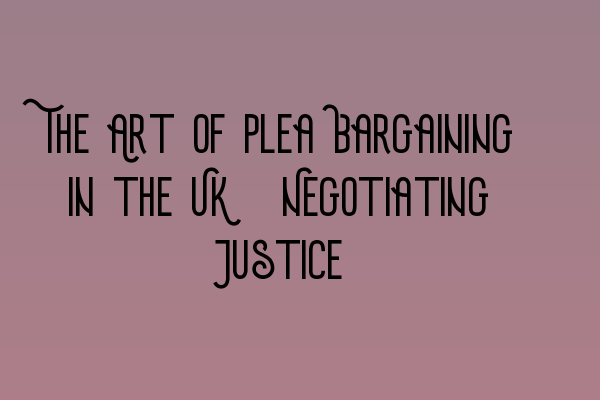The Art of Plea Bargaining in the UK: Negotiating Justice
When it comes to criminal cases in the UK, plea bargaining plays a significant role in the pursuit of justice. This legal strategy allows prosecutors and defence solicitors to negotiate and potentially reach agreements that benefit both parties involved, while also ensuring a fair outcome for the accused. In this article, we will explore the concept of plea bargaining in the UK criminal justice system and highlight its importance in achieving justice.
Plea bargaining is a complex process that involves negotiation between the prosecution and the defence. It allows the accused to plead guilty to a lesser charge or accept a reduced sentence in exchange for providing valuable information or cooperation. This arrangement not only saves time and resources but also encourages the accused to take responsibility for their actions and potentially assist in the prosecution of other criminal activities.
One significant benefit of plea bargaining is its potential for reducing the caseload on the courts. By resolving cases through negotiation, both the prosecution and the defence can avoid the lengthy process of a trial and focus on more pressing matters. This expedites the justice system and ensures that cases involving serious offences are given priority, leading to a more efficient and effective judicial system.
For defendants, plea bargaining can offer the opportunity to obtain a more lenient sentence or avoid severe penalties associated with a trial conviction. By cooperating with the prosecution, defendants can present mitigating factors that may result in reduced charges, probation, or a shorter prison sentence. In some cases, defendants may even be eligible for alternative sentencing options such as community service or rehabilitation programs.
Furthermore, plea bargaining allows defendants to have a certain level of control over their case’s outcome. By actively participating in the negotiation process, defendants have the ability to influence the charges brought against them and potentially avoid the uncertainty and risks associated with a trial. This empowerment can provide a sense of closure and enable the accused to move forward with their lives.
It is essential for both the prosecution and the defence to approach plea bargaining with careful consideration and a focus on the facts of the case. Prosecutors must evaluate the strength of their evidence and the potential risks associated with going to trial. Defence solicitors, on the other hand, must thoroughly assess their client’s situation, examine the evidence, and determine the feasibility of negotiating a plea deal. Effective communication and collaboration between both parties are crucial in ensuring a fair and just outcome.
However, it is crucial to note that plea bargaining is not always appropriate or feasible for every case. Serious crimes such as murder, rape, or offences involving significant harm to individuals or society may not be suitable for plea bargains. In such cases, the focus often shifts towards presenting the evidence in court and allowing a judge or jury to determine the accused’s guilt or innocence.
In conclusion, plea bargaining serves as an essential mechanism within the UK criminal justice system, enabling prosecutors, and defence solicitors to negotiate fair and just outcomes. This practice not only helps in reducing the caseload on the courts but also provides defendants with the opportunity for a more lenient sentence and control over the outcome of their case. It is a dynamic process that requires careful consideration and collaboration between both parties to ensure justice is served.
For more information on the SQE Criminal Law & Practice, please visit our related articles:
- SQE 1 Practice Exam Questions
- SQE 1 Practice Mocks FLK1 FLK2
- SQE 2 Preparation Courses
- SQE 1 Preparation Courses
- SRA SQE Exam Dates
